
In my dream, I was always flying…though not flying exactly. The feeling of flying is not just up, it is propelling forward. Flying is falling and catching yourself. It is moving into the expanse of infinity and being both terrified by its endlessness and comforted by no eventual earth to smash into. In my dream every movement bounded forward with momentum. Even the small moments, I fell into them.
Last week I was in Hong Kong and there was a dance symposium leading up to the performance my work was a part of. Dance presenters, artistic directors and other arts professionals gathered to talk about the dead question of what happens now in dance…more than dead, it is a false question. What is really being asked is “how do I find a way to keep it the same?”. Someone asked me at the opening night party what kinds of broad strategies should be taken to make dance more “current”. My response is that the change should not be gradually adaptive, but complete. Ballet in particular (most institutionalized dance forms as well) has kept a brittle clutch (through a refined and adaptive fundraising model) on a most-wholly diverged from this current-day path that recursively bites its own tail in one of the most uniquely bizarre bubbles. If we want to know or to be a part of what is next, the bubble very well should pop and let the pieces spread about this deeply unique moment where old ways of thinking barely apply, if at all. This is the wild west and yet our art institutions are still in the King’s England.
I struggle to find anything else in American culture that stays so rooted in such an antiquated form. Perhaps codified, religion-based communities like the Amish. The evolution in ballet has been an achievement of greater athleticism and a lesser artistry, but I hope that is not what we are striving for into the future.
So much unhappiness in the human condition comes from the illusions of maintenance. All things change and our misery comes directly from the fight against it.
I was later having coffee with some of the attendees of the symposium and someone asked me what I had going on next. I shared that I was heading to Portland, Maine to make some new choreography for Ice Dance International. One of them responded, “is that as tacky as it sounds?” It was a shocking moment because I had only so far thought of this opportunity to learn about a whole new way of moving through space as a reason to feel thankful. I was getting to step into a foreign world and apply my knowledge with the possibility of new outcomes.
When we become expert in something, there is an inevitable separateness that threatens good thinking because we, at some level believe, that because we are versed in one thing, that thing must be better than other things.
Ballet technique is so specific. Its similarities to ice skating makes it tempting to compare and contrast the meticulous exactness in ballet to the less consistent form of ice skating. But try doing it at 20mph. There are constantly shifting variables under the clunky blades on your feet that put you in constant peril. Ice skaters remind me of traveling circus performers. They specialize. They have their things they do most always. There is greater agency over one’s path and a “traveling salesman’s pack it all up in your suitcase and take on the road” Americanism.
And there is also the “otherness” of expertise here with them. I am constantly grilling them on one of my favorite subjects: Tonya Harding. And even in the most respectful and fair conversations, there is an implication about her class status and how she didn’t belong.

Thinking we “know” anything ends the exploration right there. These limitations are like the clunky, human, experience of gravity. They aren’t connected to the boundless, the infinite, the eternal. Gathering and perfecting skills make us more effective communicators; these skills broaden our reach. But to make them the thing is my enemy. Let’s be brave and strive for the realm of the limitless. Like an ice skater bounds through space with the barely frictioned ice, let’s un-invent the walls that tether us to the Earth.
I’m in the passenger seat of a car now. It’s nighttime. Every time I doze off, my body feels the terrifying catapult. Which really is the truth of what is happening. With my eyes open, I instead orient and put myself still, in a car, but with my eyes closed I know I am bounding through space, always. It is only when I confine myself to the known and classifies that I deprive myself of the infinity of space.










